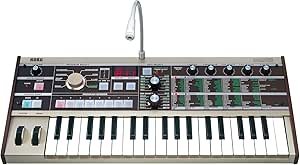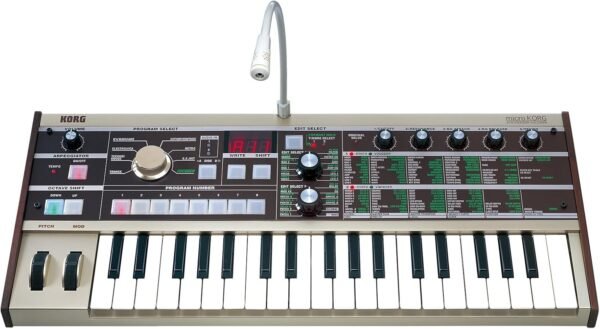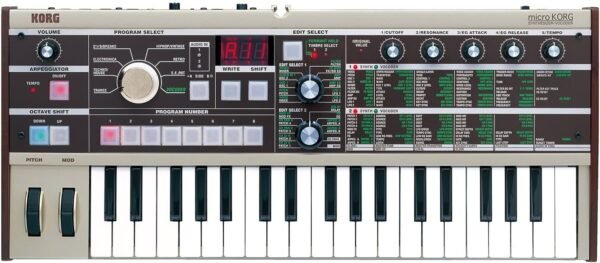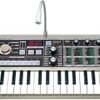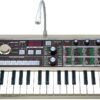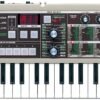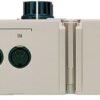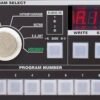Korg microKORG Synthesizer review exploring sound quality, features, and design for musicians
Korg microKORG Synthesizer review exploring sound quality, features, and design for musicians
- The vocoder feature creates stunning robotic voice effects, adding a unique character to performances.
- Its intuitive interface ensures effortless sound editing, with well-placed knobs and buttons for quick adjustments.
- Compact and lightweight design makes it easy to carry, perfect for gigs or home use.
- The built-in arpeggiator adds dynamic rhythm and texture to compositions, enhancing creativity.
- High-quality presets offer diverse soundscapes, catering to a variety of musical styles.
As an Amazon Associate I earn from qualifying purchases.
Description
Compact Design That Packs a Punch
The Korg microKORG Compact Analog Modeling Synthesizer is a true gem for musicians who need portability without sacrificing power. As someone who thrives on experimenting with sound, I was genuinely impressed by how lightweight and compact this device is. It’s small enough to fit in tight studio spaces or to carry easily for live gigs, yet it doesn’t feel flimsy. The 37 full-size keys provide a surprisingly expressive playing experience, even for someone used to larger keyboards.
Its built-in speaker is a pleasant surprise, offering immediate playback without needing to connect external gear. Though it’s not the loudest, it’s perfect for quick jam sessions or sound demos. Despite its small stature, this synthesizer delivers features that rival bulkier models.
Key Features That Amplify Creativity
What stands out most to me is the Korg XMT Sound Engine, which powers the analog modeling synthesis. The sound feels authentic, rich, and incredibly versatile. Whether I was creating ambient textures or punchy basslines, the diversity in waveforms and presets made it easy to craft unique sounds. The 4-voice polyphony, while limited compared to some high-end synths, still allows for lush, layered compositions.
One of my favorite features is the built-in vocoder. I had way too much fun experimenting with robotic voice transformations and quirky vocal effects. Pairing this with the included mini mic was seamless, and the results sounded clean and professional. The 6-step arpeggiator added another layer of creativity, allowing me to build intricate patterns effortlessly.
Intuitive Interface for Easy Tweaks
I’m not the most patient person when it comes to navigating complex menus, but the intuitive interface on this synthesizer makes sound editing straightforward. The dedicated knobs and buttons are tactile and responsive, letting me tweak settings without diving into endless submenus. Adjusting the filters, envelopes, or modulation felt natural, and I didn’t have to constantly refer to the manual.
That said, the interface has its quirks. While the layout is user-friendly, the small LCD screen can feel a bit cramped, especially when scrolling through presets. Still, for a device in this size category, it’s manageable and doesn’t take away from the overall experience.
Key Benefits
- Portable and lightweight design makes it easy to transport.
- Authentic analog modeling synthesis delivers rich and dynamic sound.
- Built-in vocoder adds unique vocal effects.
- Intuitive controls simplify sound editing and tweaking.
- MIDI connectivity allows seamless integration with other gear.
Areas for Improvement
- 4-voice polyphony might feel limiting for more complex compositions.
- Small LCD screen can be a bit difficult to navigate.
- Built-in speaker lacks volume for larger settings.
- Some presets feel dated compared to newer synths.
How It Compares to Market Rivals
When stacked against other compact synthesizers like the Novation MiniNova or the Roland JD-Xi, the Korg microKORG holds its own but comes with its pros and cons. The MiniNova, for instance, offers more voices and a deeper preset library, but its interface isn’t as intuitive for quick edits. Meanwhile, the JD-Xi has a more modern sound engine and onboard drum machine, but it’s bulkier and less portable.
The microKORG’s vocoder is a standout feature, delivering cleaner and more customizable vocal effects than its competitors. However, the limited polyphony might deter users who want to create more layered or orchestral sounds. Yet, when it comes to portability and ease of use, the microKORG shines, making it an ideal choice for beginners or gigging musicians who want a no-fuss, high-quality setup.
Worth Every Penny
In terms of value for money, this synthesizer hits a sweet spot. It’s not the cheapest on the market, but it offers a robust set of features that justify the investment. The build quality, sound engine, and creative tools make it an excellent option for budding musicians and seasoned pros alike. While it might not replace a full-fledged workstation, it’s an excellent addition to any setup.
For those who prioritize portability and versatility, this synthesizer proves itself as a reliable companion for both studio and stage. It may not be perfect, but it’s a solid choice for anyone looking to dive into analog modeling synthesis without breaking the bank.
